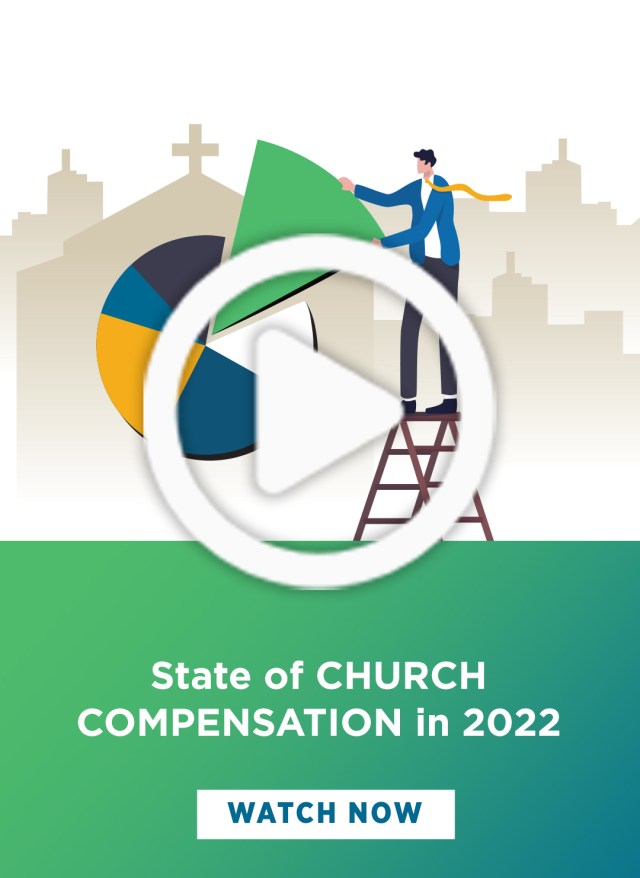A new survey of more than 1,500 church leaders shows the negative effects of the Great Recession eased for some during 2010, with more churches reporting giving increases compared to 2009.
In the 2011 State of the Plate, co-sponsored by Christianity Today International’s Church Finance Today, Maximum Generosity, and the Evangelical Council for Financial Accountability, 43 percent said collections at their church rose, compared to 36 percent who said the same the prior year.
But 39 percent reported giving declined, virtually unchanged from the 38 percent who indicated the same in 2009, meaning challenges remain for many congregations. The Southeast and Pacific regions struggled most, as did small congregations of 250 people or less, according to the constituency survey, which did not involve random sampling and contained no margin of error.
Beyond actual collections, the survey also asked churches how their giving affected budget priorities and planning:
for budgets:
46 percent said their current budgets were bigger than last year’s;
22 percent said their budgets remained flat;
31 percent said their budgets shrunk.
for expenditures:
Spending increased most on staff salaries, missions, facilities, and benevolence/help for the needy;
Spending decreased most for staff travel/conferences, ministry programs, and building expansions/renovations.
Ruling Leaves Door Open for Housing Allowance Defense
background
Section 107 of the federal tax code exempts from federal income tax
the fair rental value of a church-owned parsonage provided to a minister as compensation for ministerial services, and
the amount of a minister’s compensation that is designated in advance as a housing allowance to the extent that the allowance represents compensation for ministerial services, is used to pay housing expenses, and does not exceed the fair rental value of the home (furnished, plus utilities).
Section 265(a)(6) of the federal tax code allows a minister of the Gospel to claim itemized deductions for residential mortgage interest and property taxes, even though the money used to pay such amounts was received from a church or other employer in the form of a tax-exempt housing allowance.
The Freedom from Religion Foundation (“FFRF”) and several other plaintiffs have filed a lawsuit in a federal district court in California challenging the constitutionality of the parsonage exclusion and housing allowance. The lawsuit also challenges the constitutionality of section 265(a)(6). The lawsuit alleges:
Sections 107 and 265(a)(6) of the Revenue Code … violate the Establishment Clause of the First Amendment, in part, because they provide tax benefits only to “ministers of the gospel,” rather than to a broad class of taxpayers.
Sections 107 and 265(a)(6) subsidize, promote, endorse, favor, and advance churches, religious organizations, and “ministers of the gospel,” and they discriminate against secular organizations, including nonprofit organizations such as FFRF that promote atheism, humanism, secularism, and other non-religious worldviews, as well as their employees and members.
Sections 107 and 265(a)(6) are not permissible “accommodations” of religion under the Establishment Clause, in part, because the income taxation of ministers of the gospel under the general rules that apply to other individuals would not interfere with the religious mission of churches or other organizations or the ministers themselves.
The [housing allowance] has the effect each year of excluding hundreds of millions of dollars from taxation, and this exclusion is available only to ministers of the gospel. The tax preferences granted to ministers of the gospel under the Internal Revenue Code … also enables churches and other religious organizations to reduce their salaries and compensation costs. The employees of secular organizations such as FFRF are not allowed these tax preferences, and FFRF and other secular organizations incur comparatively greater compensation costs than they would if their employees could be considered “ministers of the gospel.”
The tax preferences afforded ministers of the gospel constitute a subsidy that results in tangible and direct economic injury to FFRF, and to its members and employees, who cannot claim these benefits.
The FFRF’s lawsuit asks the court to rule that sections 107 and 265(a)(6) of the federal tax code violate the Establishment Clause of the First Amendment to the United States Constitution, which prohibits any governmental establishment of religion.
the government’s motion to dismiss
The federal government, which is defending the constitutionality of the housing allowance (since it is a federal statute) asked the court to dismiss the lawsuit on the ground that the FFRF lacked “standing” to pursue its claim. Standing is a requirement of any plaintiff in a federal case. It has been described by the United States Supreme Court as follows:
The party who invokes the power [of the federal courts] must be able to show not only that the statute is invalid, but that he has sustained or is immediately in danger of sustaining some direct injury as a result of its enforcement, and not merely that he suffers in some indefinite way in common with people generally. Doremus v. Board of Ed. of Hawthorne, 342 U.S. 429 (1952).
The California district court ruled last year that the FFRF had standing, and so it denied the government’s request to dismiss the case.
But FFRF’s challenge to the constitutionality of the housing allowance may have been dealt a lethal blow by a recent decision by the United States Supreme Court. The Supreme Court ruled that a group of Arizona taxpayers lacked standing to challenge the constitutionality of a state law that gave tax credits for contributions to “school tuition organizations” (STOs). STOs provided scholarships to students attending private schools, including religious schools. It noted that the courts have consistently ruled that standing cannot be based on a plaintiff’s status as a federal taxpayer because the “injury” is too remote or speculative.
The Court acknowledged a limited exception to taxpayer standing in cases challenging legislation on the basis of the First Amendment’s nonestablishment of religion clause. Taxpayers have standing in such cases to challenge direct transfers of tax revenue to religious organizations since “the taxpayer’s allegation in such cases would be that his tax money is being extracted and spent in violation of specific constitutional protections against such abuses of legislative power.”
FFRF argued that they had standing because the Arizona tax credit was in essence a governmental expenditure for religion. The Court disagreed, noting that there is a fundamental difference between granting a tax credit to taxpayers, and using tax dollars to directly benefit religion. It observed:
It is easy to see that tax credits and governmental expenditures can have similar economic consequences, at least for beneficiaries whose tax liability is sufficiently large to take full advantage of the credit. Yet tax credits and governmental expenditures do not both implicate individual taxpayers in sectarian activities. A dissenter whose tax dollars are [diverted to religious organizations] knows that he has in some small measure been made to contribute to an establishment [of religion] in violation of conscience. In that instance the taxpayer’s direct and particular connection with the establishment [of religion] does not depend on economic speculation or political conjecture. The connection would exist even if the conscientious dissenter’s tax liability were unaffected or reduced. When the government declines to impose a tax, by contrast, there is no such connection between dissenting taxpayer and alleged establishment [of religion]. Any financial injury remains speculative. And awarding some citizens a tax credit allows other citizens to retain control over their own funds in accordance with their own consciences.
The distinction between governmental expenditures and tax credits refutes [the plaintiffs’] assertion of standing …. [The Arizona tax credit] does not spend a conscientious dissenter’s funds in service of an establishment [of religion] or force a citizen to contribute … to a sectarian organization. On the contrary … Arizona taxpayers remain free to pay their own tax bills, without contributing to an STO. They are likewise able to contribute to an STO of their choice, either religious or secular. And they also have the option of contributing to other charitable organizations, in which case they may become eligible for a tax deduction or a different tax credit. The STO tax credit is not tantamount to a religious tax or to a tithe. It follows that [the plaintiffs] neither alleged an injury for standing purposes under general rules nor met the exception.
The Supreme Court’s ruling in the Arizona case may well spell the end of the constitutional challenge to the housing allowance, since a housing allowance, like the Arizona tax credit, involves no direct transfer of tax revenue for religious purposes.
The government will likely renew its motion to dismiss the FFRF lawsuit on the basis of the Supreme Court’s recent decision. Even if the California district court reaffirms its conclusion that FFRF has taxpayer standing, this does not necessarily spell the end of the housing allowance. There are several considerations that support the constitutionality of the parsonage exclusion and housing allowance, including the following:
In Walz v. Commission, 393 U.S. 664 (1970) the United States Supreme Court concluded that “the grant of a tax exemption is not sponsorship.” Further, the Court noted, “an unbroken practice of according the exemption to churches, openly and by affirmative state action, not covertly or by state inaction, is not something to be lightly cast aside.” The Court quoted Justice Oliver Wendell Holmes’ aphorism that “if a thing has been practiced for two hundred years by common consent, it will need a strong case for the Constitution to affect it.” This is a compelling argument. The parsonage exclusion has been with us since 1921, and the housing allowance since 1954. Not covertly, but by action of Congress. As one law professor has noted, “The parsonage exclusion has a remarkably ‘unambiguous and unbroken’ history of acceptance.” There has not been a single case in which its constitutionality has been challenged.
The courts have consistently upheld the constitutionality of state and federal grants, loans, and financial aid programs that benefit ministerial students attending seminaries. Why? Because the beneficiary is the individual, not “religion.”
Section 119 of the tax code exempts from income tax free lodging that is provided to an employee for the “convenience of the employer.” This benefit applies to all, regardless of profession or faith, and the same concept underlies the housing allowance. So, the FFRF lawsuit is wrong in asserting that section 107 singles out clergy. The fact is that section 119 extends a very similar benefit to everyone.
While not a constitutional argument, it should be noted that an elimination of the housing allowance would have an immediate and, in some cases, catastrophic financial effect on hundreds of thousands of ministers who have purchased a home and secured a mortgage loan in reliance on the housing allowance exclusion. Many of these ministers no longer would be able to afford their mortgage loan payments, and would be forced to sell their home in a stagnant and severely undervalued real estate market. Any federal court decision invalidating the housing allowance would have the effect of punishing countless ministers for justifiably relying on a nearly century-old tax benefit.
Church Law & Tax Report is published six times a year by Christianity Today International, 465 Gundersen Dr. Carol Stream, IL 60188. (800) 222-1840.© 2011 Christianity Today International. editor@churchlawandtax.com All rights reserved. This publication is designed to provide accurate and authoritative information in regard to the subject matter covered. It is sold with the understanding that the publisher is not engaged in rendering legal, accounting, or other professional service. If legal advice or other expert assistance is required, the services of a competent professional person should be sought. “From a Declaration of Principles jointly adopted by a Committee of the American Bar Association and a Committee of Publishers and Associations.” Annual subscription: $69. Subscription correspondence: Church Law & Tax Report, PO Box 37012, Boone, IA 50037-0012.




